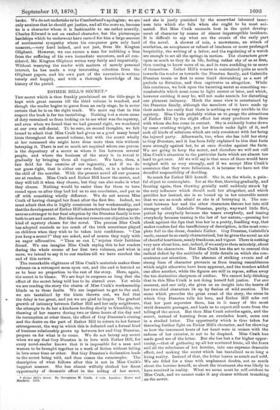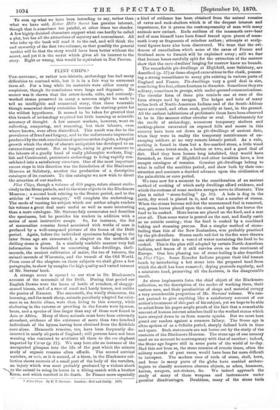ESTHER HILL'S SECRET.*
THE secret which is thus frankly proclaimed on the title-page is kept with great success till the third volume is reached, and though the reader begins to guess from an early stage, he is never certain that he is on the right track. We must say that in this respect the book is far too tantalizing. Nothing but a stern sense of duty restrained us from looking on to see what was the mystery, and even when we found that we had guessed right, we wondered at our own self-denial. To be sure, on second thoughts, we felt bound to admit that Miss Craik had given us a good many broad hints throughout the second volume, but with the secret wholly at her command she might have done more than this without betraying it. There is not so much art required where one person is the depositary of a secret as where it lies between several people, and where the business of the story is to reveal it gradually by bringing them all together. We have, then, a fair field for the exercise of our ingenuity, and if we do not guess right, that is either our own fault, or is a tribute to the skill of the novelist. With the present novel all our guesses are at random. Miss Craik and Esther Hill know the secret, and they will tell it when they choose, but they can also make it what they choose. Nothing would be easier than for them to turn round upon us after they had led us to one conclusion, and put us off with something wholly different. We do not accuse Miss Craik of having changed her front after the first fire. Indeed, we must admit that she is highly consistent in her workmanship, and that the development of Esther Hill's character from her first appear- ance as estranger to her final adoption by the Dunstan family is true both to art and nature. But this does not remove our objection to the kind of mystery chosen for the novel. The process Miss Craik has adopted reminds us too much of the trick sometimes played on children when they wish to be taken into confidence. " Can you keep a secret ?" they are asked, and of course they reply with an eager affirmative. " Then so can I," rejoins their faithless friend. We can imagine Miss Craik saying this to her readers during the whole course of her first two volumes, and what is more, we intend to say it to our readers till we have reached the end of this review.
The remarkable slightness of Miss Craik's materials makes these volumes on a retrospect seem spun out, and the end is hurried so as to bear no proportion to the rest of the story. Here, again, the secret is to blame. We are kept in suspense so long that the effect of the secret being told has to be slurred over. Yet while we are reading the story the charm of Miss Craik's workmanship blinds us to these faults. We are impatient to get to the end, we are tantalized by the hints thrown out, we feel that • the delay is too great, and yet we are glad to linger. The gradual growth of intimacy between Esther Hill and her only neighbours, the attempts to do her a kindness leading slowly to friendship, the thawing of her reserve during two or three hours of the day and its resumption at other times, the effect of Guy Dunstan's coming and the desire on the part of Esther Hill to return to her former estrangement, the way in which this is defeated and a formal kind of business relationship grows up between her and Guy Dunstan, prepare us for what is to come. We do not betray any secret when we say that Guy Dunstan is in love with Esther Hill, for every novel-reader knows that it is impossible for a man and woman to be brought together in a work of fiction without falling in love some time or other. But Guy Dunstan's declaration leads to the secret being told, and then comes the catastrophe. The description of what follows after this is not in Miss Craik's happiest manner. She has almost wilfully shirked her finest opportunity of dramatic effect in the telling of her secret,
• Esther Hilts Secret. By Georgians M. Craik. 3 vole. London : Hurst and Blackett. 1870.
and she is justly punished by the somewhat laboured tame- ness into which she falls when she ought to be most ani- mated. But Miss Craik succeeds best in the quiet develop- ment of character by means of almost imperceptible incidents.
It is difficult to say what are the events of the early part of the novel. A shower of rain, a snowstorm, an attack of scarlatina, an acceptance or refusal of luncheon or more prolonged hospitality, the writing of a letter, and the regulating of a watch are enough to set all the springs in motion. The characters grow upon us much as they do in life, feeling rather shy of us at first, then coming to know more of us, and in turn confiding to us more of themselves. Esther Hill's reserve is maintained quite as much towards the reader as towards the Dunstan family, and Gabrielle Dunstan treats us first to some timid skirmishing as a sort of prelude to flirtation, and then captivates us altogether. While this continues, we look upon the haunting secret as something un- comfortable which must come to light sooner or later, and which, however exciting it may be, will not make amends for disturbing our pleasant intimacy. Much the same view is entertained by the Dunstan family, although the members of it have made up their minds too easily that there is nothing so very terrible in the mystery. Miss Craik probably wishes us to gauge the attractions of Esther Hill by the slight effect her story produces on those with whom she has come in contact. She is evidently borne down by some crushing weight, yet her friends make light of it, and seek all kinds of solutions which are only consistent with her being the injured party. Afterwards, too, when she has told her story to Guy Dunstan, and it has been fully explained to him that facts were strongly against her, he at once decides against the facts. We are going to keep the secret, and therefore we will not call' Miss Craik's attention to the particular facts which are almost too hard to get over. All we will say is that some of them would have weighed with us very strongly, and if we accept Miss Craik's assurance that they were fallacious, it is because we have not the dreadful responsibility of deciding.
So much for Esther Hill herself. She is, on the whole, a pain- ful object to contemplate. Ice at the first, thaWing gradually, and freezing again, then thawing genially until suddenly struck by the very influence which should melt her altogether, and which petrifies her instead, she is so bound up in her miserable secret that we are as much afraid as she is of betraying it. The con- trast between her and the other characters throws her into still stronger relief. Gabrielle Dunstan, pretty, wayward little flirt, petted by everybody because she teases everybody, and teasing everybody because teasing is the law of her nature,—pressing her cheek against the lips that kiss her in a pretty, fondling way, that makes readers feel the insufficiency of description, is the most com- plete foil to the drear, desolate Esther. Guy Dunstan, Gabrielle's uncle, cannot be so easily characterized, but he gives the novel an air of cheerful heartiness, manly frankness, and vigour. There is nothing very new about him, nor, indeed, if we analyze them minutely, about any of the characters. But Miss Craik has the art to conceal this radical defect by the multitude of little details on which she con- centrates our attention. The absence of striking events and of strong lines of character prevents us from tracing resemblances which might otherwise have been apparent, and the touches added one after another, while the figures are still in repose, soften away the too distinctive sharpness of outline. We cannot help thinking that in this Miss Craik is not doing herself full justice. For one moment, and one only, she gives us an insight into the hearts of her two chief characters lit up by flashes of wild emotion. The scene which precedes the great event of the story, the scene in which Guy Dunstan tells his love, and Esther Hill sobs out that her past separates them, has in it many of the most vivid dramatic passages, and leads us to expect still more from the telling of the secret. But then Miss Craik subsides again, and the secret, instead of bursting from an overladen heart, oozes out in a studied letter. The opportunity which is thus taken for throwing further light on Esther Hill's character, and for with the us how the innermost beats of her heart were in unison it
sadness of her exterior, is not to be despised. Miss Craik has. made good use of the letter. But she has lost a far higher oppor- tunity,—that of gathering up all her scattered hints, all the fears and all the reluctance of her heroine, into one supreme dramatic effect, and making the secret which has tantalized us so long a living reality. Instead of that, the letter leaves us numb and cold. We are filled for a time with unpleasant doubts, not so much about the heroine herself, as about the treatment she was likely to• have received in reality. What we mean must be self-evident to. Miss Craik, and we cannot make it any clearer without trenching on the secret.
To sum up what we have been intending to say, rather than what we have said, Esther Hill's Secret has genuine interest, though that is sometimes too painful, at other times too slender. A few highly-finished characters support what can hardly be called a plot, but has all the attractions of mystery and concealment. All who take up the book will read it to the end, and will think the end unworthy of the first two volumes, so that possibly the general verdict will be that the story would have been better without the secret, and yet it is the secret which gives all its interest to the story. Right or wrong, this would be equivalent to Not Proven.































 Previous page
Previous page